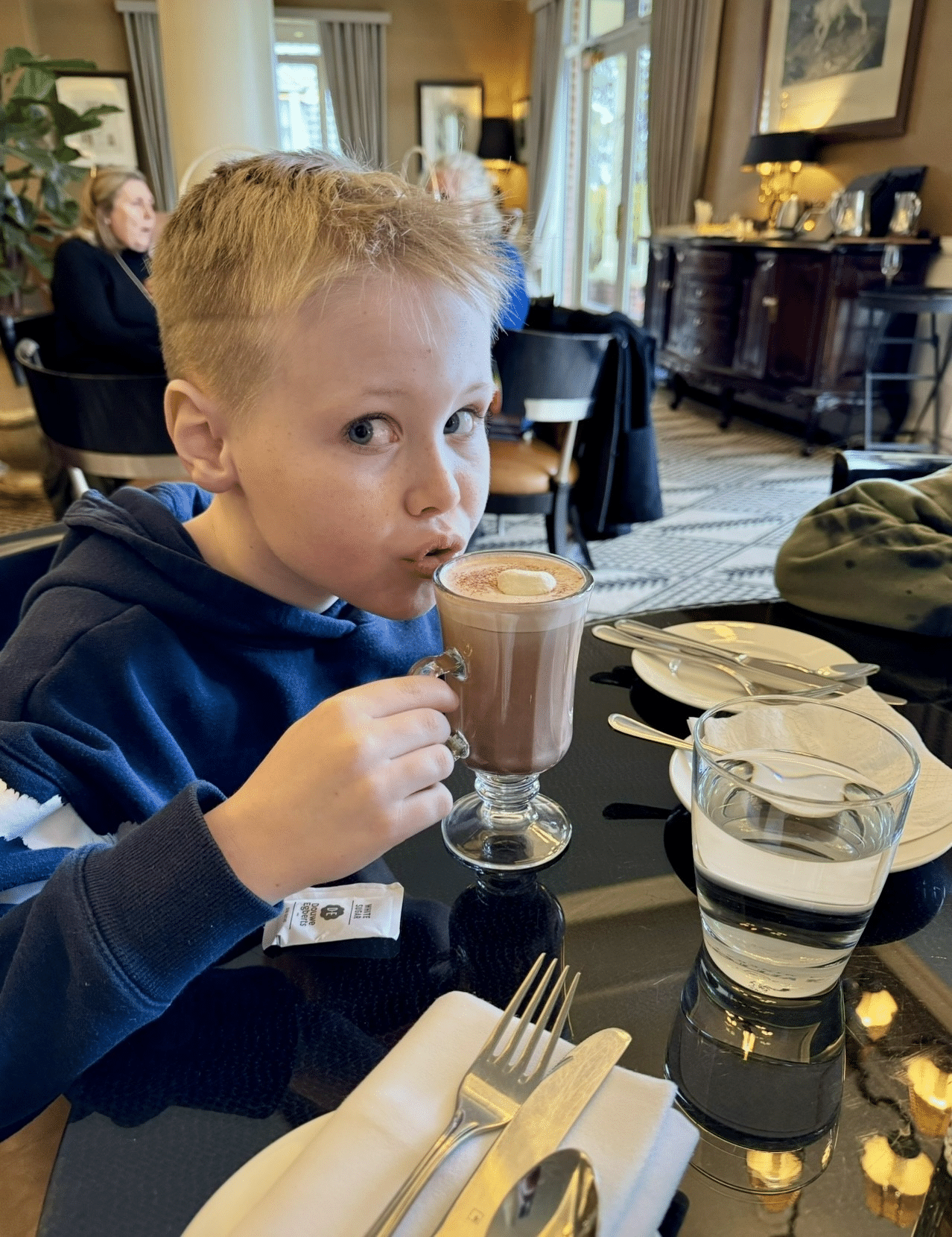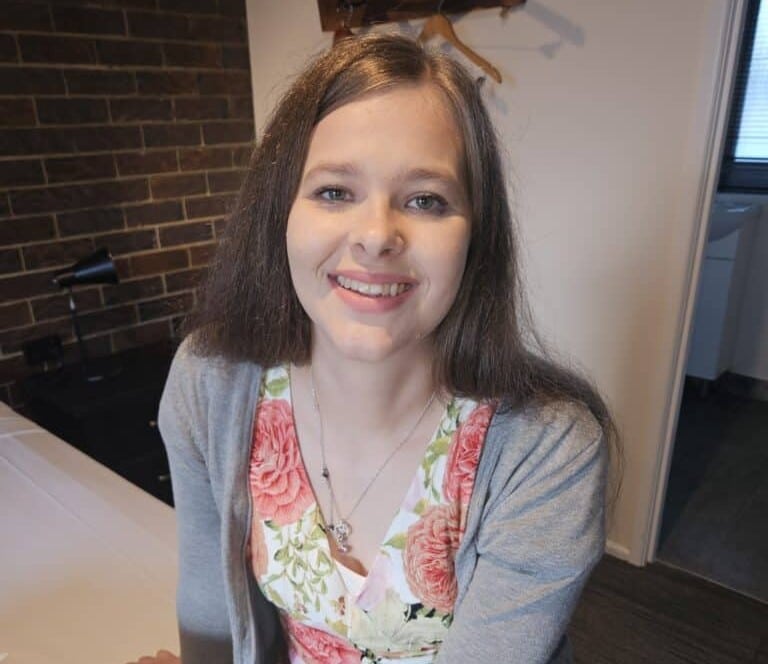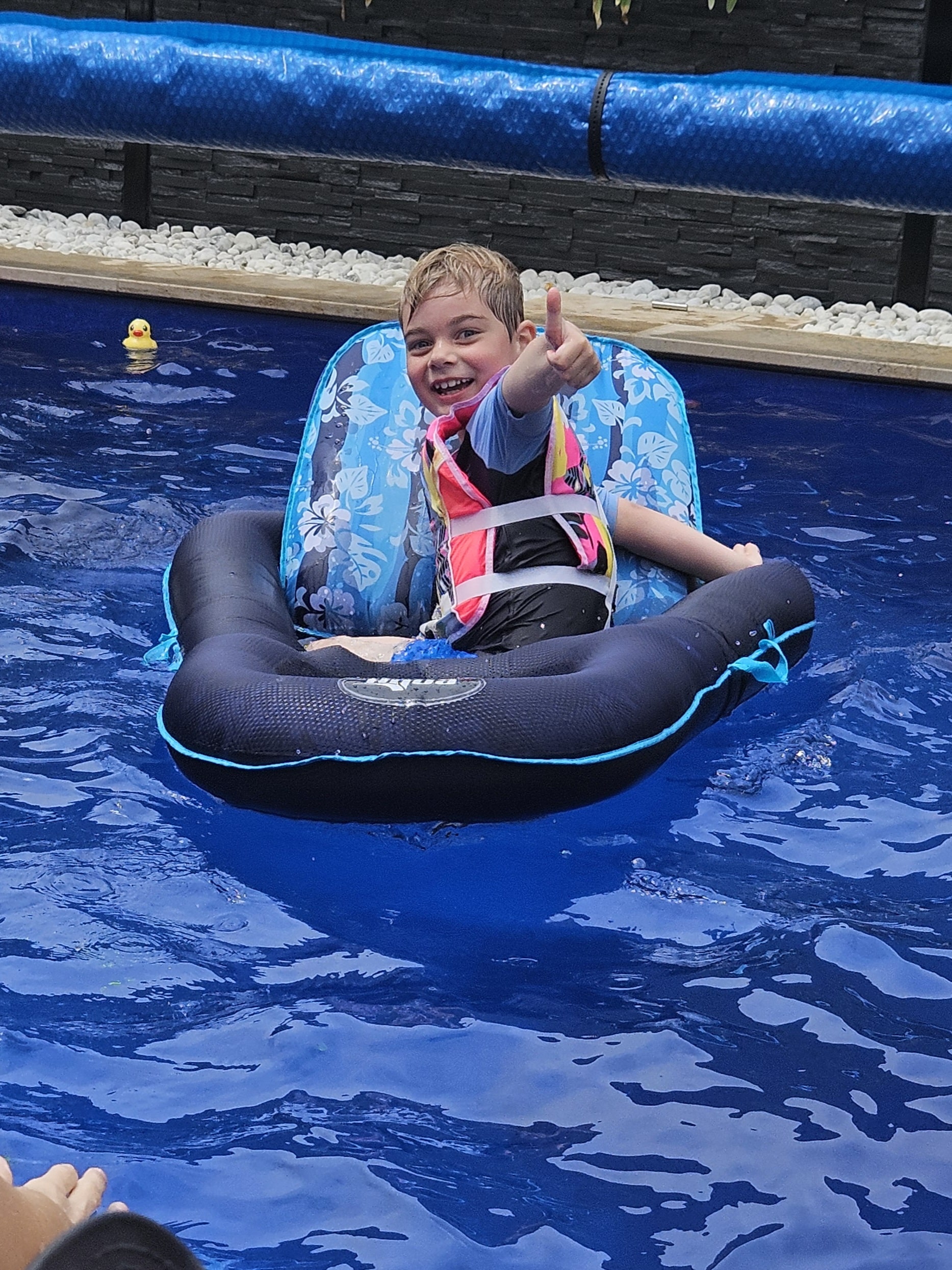Siblings – Clare, Cooper and Belinda
We asked people who have a brother or sister with TSC to share their stories. These were published in the April 2018 issue of Reach Out. Thank you to each of the siblings who volunteered to share their stories with us.
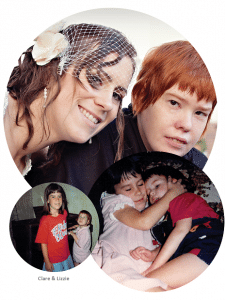
Clare’s Story
Lizzie was born when I was 2 years old. She was severely affected by TSC and polycystic kidney disease (PKD). She had a profound intellectual disability, never developed speech and went into kidney failure in her 20s. There was no family history and I travelled the journey of TSC and PKD along with Lizzie because of an unlucky draw from the genetic lottery. I think understanding the huge role luck or fortune plays in all our lives is the biggest difference I have always seen between myself and my peers.
Whenever I read an article on siblings of people with disabilities I find I check most of the boxes. I was fairly mature and willingly contributed to the huge amount of care Lizzie required. But I was also jealous of the huge amounts of free time some of my friends seemed to have. I loved Lizzie intensely with a simplicity I didn’t experience again until I had my own children. I was so proud of everything she accomplished. I knew my parents were busy and subconsciously didn’t turn to them for help in the same way my friends may have done to their parents. I defined myself as ‘the smart one’ and worked hard at school partly to get the recognition that came with that academic achievement. Being Lizzie’s sister made me strong and resilient, but also meant I had to learn slowly that sometimes it is ok to ask for help.
I knew my parents were busy and subconsciously didn’t turn to them for help in the same way my friends may have done to their parents.
Caring for her while she was sick and dying when we were both in our twenties brought its own set of challenges. It was like being attached to a piece of elastic. Sometimes I’d try to live my own life and not be too involved in what was happening at home. My parents made it clear there was no obligation or expectation on me or my brothers. After a while, I would feel a pull to become more involved, being overwhelmed by the reality of her declining health and also the impact it was having on my parents and my youngest brothers. During this time I travelled and lived overseas but also felt uncomfortable that my sister didn’t have the freedom I had.
Lizzie’s death came at a huge time of transition for me. She died a few months after my wedding and I gave birth to my first child just after her first anniversary. It is an ongoing sadness for me that my two children will never meet their aunty Lizzie and experience her wicked sense of humour, unconventional dancing and unconditional love. But I tell them about TSC, the work I do and why I do it. When I explain to new families with TSC that their child has the opportunities of earlier interventions and new treatments that no previous generation of children with TSC has had, I am genuinely proud to be able to say that, but I am also sad for what Lizzie missed out on.
Cooper’s Story
I am 10 years old and since my brother was born, it’s been a twisted life. Lachlan is now 6 years old and has Tuberous Sclerosis Complex (TSC). He’s had brain surgery and also has autism.
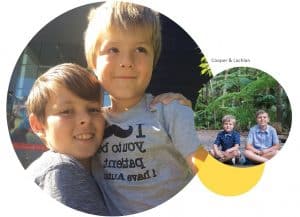
It’s not often that you get a good kind of Lachie, but I think you’ve got to love what you’ve got. We get to play games together, we love adventures and we love tickling each other.
I know that TSC means that Lachie sometimes doesn’t behave himself. Sometimes he’ll give kisses and hugs; other times he’ll smack or scratch. It’s his choice, but his brain makes different choices than our brains.
I talk about Lachie and about how he’s had brain surgery and how tough it is with him sometimes. I explain that he’s the reason I don’t always get to school on time and don’t get to play with my friends a lot. Now that my friends understand, they do play with Lachie sometimes. I tell them to be careful when touching Lachie.
One of the hardest parts of being Lachie’s big brother is being woken up early in the morning to be played with. You don’t get much shut eye with Lachie in the house.
When I play soccer Lachie sometimes interrupts the game. He screams out loud and claps. He joins in with our family activities.
My teacher’s brother also has autism but he’s different to Lachie. I’ve learnt some new things about autism from chatting with my teacher, like how people with autism can learn things, but they may need to be shown something a lot of times for them to learn it.
Having a difficult life means I get to learn how to cope. I get to teach Lachie things and he teaches me stuff back.
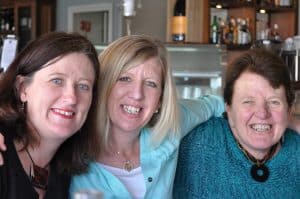
Belinda’s Story
I am in my 40s and live in Sydney. I am a wife, a mum to 2 kids, and I work in the financial services industry. I have 3 siblings and 2 of my sisters, Christine and Maryanne, were born with Tuberous Sclerosis Complex (TSC).
Christine is 5 years older than me and lives in a group home with others with intellectual disabilities in Sydney. TSC has also affected her kidneys and she’s been on dialysis for the last 2 years. Growing up, I remember Christine was not able to do the things that Maryanne and I could and there’s a lot of sadness that comes with that. She did join in with family events and holidays but, there was always a lot we had to do, for Christine to be able to join us.
I remember when we were children that there wasn’t as much of a difference. We’d play and listen to music together and do things, as you would with any sister. As we got older there was a realisation that she was different. Three of us went off to our school, but Christine went to a different school. We were all very protective of Christine. Kids could be very cruel and we stuck up for her.
Christine moved out of our family home when she turned 18. I would visit her and take her out, making sure she had social events. As we both grew up and had our own families, Maryanne and I shared having her stay with us for weekends and coordinating her health care.
Maryanne, my younger sister, also had TSC but this did not affect her mentally and we had a relationship similar to many sisters, including going to concerts and parties. After she was diagnosed with TSC, I did provide emotional and practical support for Maryanne. She struggled with the marks on her face, especially as a teenager. I also helped by taking her to medical appointments. Maryanne got married and had a son and everything was pretty normal.
Three years ago Maryanne started having severe headaches. It took some time before we found out this was due to a large subependymal giant cell astrocytoma (SEGA) growing in the middle of her brain. In February 2015 Maryanne died from complications relating to this tumour. It has been a very difficult few years adjusting to life without her as well as supporting her husband and son.
There’s a lot more information and awareness about TSC now and I find it much easier to support my sister and understand this disease.
These days I play a significant role in Christine’s care, with most of this falling to me now that Maryanne has passed away. This includes coordinating her NDIS plan, her group home and her health care. For example, Christine’s in hospital right now and I have been visiting regularly and making sure she has some carers to spend time with her – juggling that along with my own work and family life.
Things have changed a lot for TSC in recent years. When I was younger there wasn’t as much information available on TSC. I didn’t really know how to deal with different aspects of my sisters’ condition. Even when we went to medical appointments few doctors knew about TSC.
When I think about how TSC has affected my life, I think I have more empathy than other people. I have more of an understanding and awareness of, not just TSC, but other conditions and issues as well.
I learnt through our experience with Maryanne that keeping on top of TSC is crucial. Don’t become complacent with regular checks and tests.
If I was giving advice to other siblings of people with TSC, I’d tell them to embrace it. We still had heaps of fun and life was mostly normal. Get as much information as you can about TSC – it is complicated! I learnt through our experience with Maryanne that keeping on top of TSC is crucial. Don’t become complacent with regular checks and tests.
TSA has a great website, and the Facebook group is really useful for connecting with others and asking questions (even if it’s very parent focussed sometimes). Becoming a part of the community reminds you that you’re not alone.

